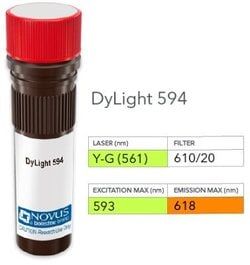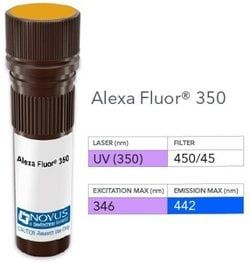CD44 Antibody (CD44v4/1700R), DyLight 488, Novus Biologicals™
Manufacturer: Novus Biologicals
Select a Size
| Pack Size | SKU | Availability | Price |
|---|---|---|---|
| Each of 1 | NB008413-Each-of-1 | In Stock | ₹ 57,494.00 |
NB008413 - Each of 1
In Stock
Quantity
1
Base Price: ₹ 57,494.00
GST (18%): ₹ 10,348.92
Total Price: ₹ 67,842.92
Antigen
CD44
Classification
Monoclonal
Conjugate
DyLight 488
Formulation
50mM Sodium Borate with 0.05% Sodium Azide
Gene Symbols
CD44
Immunogen
Recombinant fragment corresponding to the v4 domain of human CD44 (Uniprot: P16070)
Quantity
0.1 mL
Research Discipline
Angiogenesis, Apoptosis, Cancer, Cell Biology, Core ESC Like Genes, Extracellular Matrix, Hematopoietic Stem Cell Markers, Immunology, Mesenchymal Stem Cell Markers, Oncogenes, Phospho Specific, Protein Kinase, Signal Transduction, Stem Cell Markers
Test Specificity
This antibody recognizes an epitope encoded by exon v4 on the variant portion of human CD44. The CD44 molecule belongs to a family of cellular adhesion molecules found on a wide range of normal and malignant cells in epithelial, mesothelial and hemopoiesis tissues. CD44 is a single gene with 20 exons, of which 10 are normally expressed to encode the basic CD44 (H-CAM) molecule. The additional 10 exons (v1 to v10) are only expressed by alternative splicing of the nuclear RNA.The expression of specific cell adhesion molecule CD44 splice variants has been reported to be associated with metastasis in certain human malignancies.
Content And Storage
Store at 4°C in the dark.
Applications
Flow Cytometry, Immunohistochemistry, Immunocytochemistry, Immunofluorescence, Immunohistochemistry (Paraffin)
Clone
CD44v4/1700R
Dilution
Flow Cytometry, Immunohistochemistry, Immunocytochemistry/Immunofluorescence, Immunohistochemistry-Paraffin
Gene Alias
CD44 antigen, CD44 molecule (Indian blood group), CD44R, CDw44, cell surface glycoprotein CD44, chondroitin sulfate proteoglycan 8, CSPG8, ECMR-III, Epican, Extracellular matrix receptor III, GP90 lymphocyte homing/adhesion receptor, HCELL, hematopoietic cell E- and L-selectin ligand, Heparan sulfate proteoglycan, Hermes antigen, homing function and Indian blood group system, HUTCH-I, Hyaluronate receptor, IN, LHR, MC56, MDU2CD44 antigen (homing function and Indian blood group system), MDU3CDW44, MIC4MGC10468, Pgp1, PGP-1, PGP-I, Phagocytic glycoprotein 1, Phagocytic glycoprotein I
Host Species
Rabbit
Purification Method
Protein A purified
Regulatory Status
RUO
Primary or Secondary
Primary
Target Species
Human
Isotype
IgG
Related Products
Description
- CD44 Monoclonal specifically detects CD44 in Human samples
- It is validated for Immunohistochemistry, Immunohistochemistry-Paraffin.


